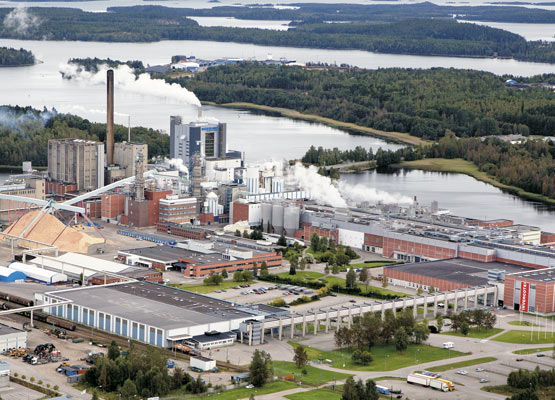A quality paperboard reduced the total cost
/INS. “Choosing the right paperboard reduced the cost of the entire production,” says Gary Peeling, CEO of the family-owned printers Precision Printing in Barking in east London. “Not only that — if we’d taken the cheap route in choosing a material, we couldn’t have done the job.”
In the autumn of 2013 he was asked to do what must be the ultimate dream job for any digital printer. American Express planned to do a direct mailing to 280,000 customers in the UK. “Think Big — Shop Small” was the theme and aimed to persuade cardholders to make discounted purchases in small shops on a particular day. The date set was the 7 December and the 280,000 mailings had to reach Amex’s customers well in advance.
The mailing was designed by Ogilvy, London and involved several challenges. It was in a concertina format and the background colour in the bleed area was also black, which can create considerable risk of cracking at the folds.
“If we’d used a standard paperboard — any of them — we’d have been forced to laminate the paperboard at a cost of £14,000 to avoid cracks,” Gary explains. “By choosing Invercote Creato from Iggesund Paperboard we didn’t have to laminate because it doesn’t crack after you’ve creased it.”
The benefits didn’t stop there. Lamination would also have made it impossible to machine fold the mailings because there would have been a stronger crease rebound. The alternative would have been to hand fold and hand pack the 280,000 units.
“Then we would simply not have finished the job in time,” Gary says. “Invercote Creato functioned perfectly in our process and increased our productivity in an impressive way. Such effects are rarely visible in small jobs but with a bigger print run the effects on both productivity and overall economy become very obvious.”
The question of why digital printing was chosen at all for a job with such a large edition size is itself interesting. Only a few years ago people said it was hardly worthwhile to digitally print editions over 500. In this case, one cause of the improved productivity was that Precision Printing decided early on to invest in an HP Indigo 10000 with a larger sheet size than the digital standard.
“Now we can get five A4 sheets from a print sheet instead of just two, which of course reduces the total cost per unit. That, combined with the ability to personalise in four colours instead of doing a laser printing, was the key reason behind the decision to digitally print the edition,” Gary concludes.
For more than a decade people have said that personalisation will become an important driver of digital printing’s development. Perhaps Precision Printing’s job for American Express proves that elegant personalisation can in fact be more important than constantly striving for the lowest unit cost.
Caption:“Invercote is far from being the cheapest option if you only look at the price per kilo but its properties enabled us to save £14,000 by not having to laminate,” says Gary Peeling, CEO of Precision Printing, which digitally printed 280,000 copies of a mailing for an American Express campaign.© Iggesund
About Iggesund
Iggesund Paperboard is part of the Swedish forest industry group Holmen, one of the world’s 100 most sustainable companies listed on the United Nations Global Compact Index. Iggesund’s turnover is just over €500 million and its flagship product Invercote is sold in more than 100 countries. The company has two brand families, Invercote and Incada, both positioned at the high end of their respective segments. Since 2010 Iggesund has invested more than €380 million to increase its energy efficiency and reduce the fossil emissions from its production.
Iggesund and the Holmen Group report all their fossil carbon emissions to the Carbon Disclosure Project. The environmental data form an integral part of an annual report that complies with the Global Reporting Initiative’s highest level of sustainability reporting. Iggesund was founded as an iron mill in 1685, but has been making paperboard for more than 50 years. The two mills, in northern Sweden and northern England employ 1500 people.
Further information:
Staffan Sjöberg
Public Relations Manager
staffan.sjoberg@iggesund.com
Iggesund Paperboard
SE-825 80 Sweden
Tel: +4665028256
Mobile: +46703064800
www.iggesund.com












Let us know if you are going to use this press release. Thank you!